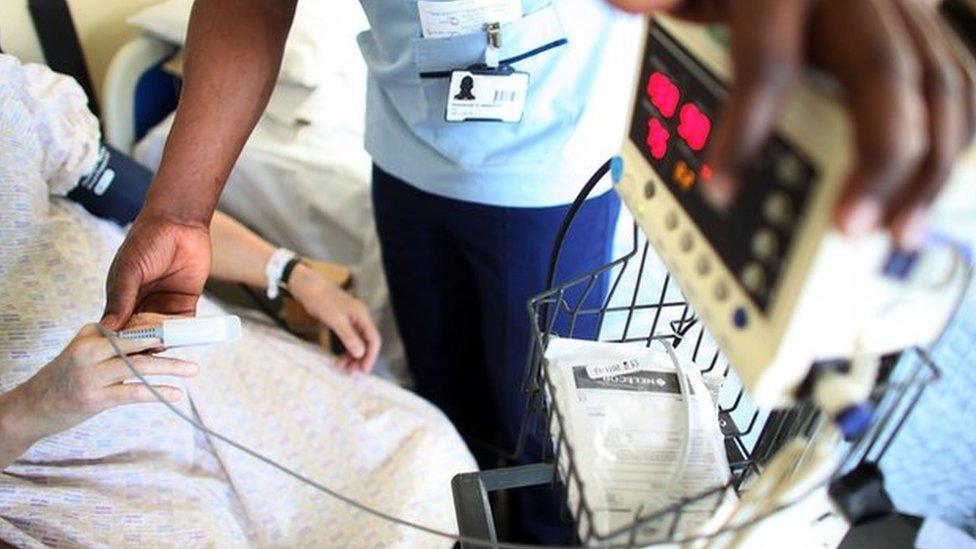Health manifestos - UKIP dissected
- Published

Health is arguably the most important issue for many voters at next week's Welsh Assembly election.
BBC Wales has asked some of the main medical and health organisations to give an examination to the parties' manifestos and give their critique of their policies.
Here is the dissection of the UKIP manifesto:, external


The Royal College of Physicians, external welcomed commitments to:
Train the required number of doctors
Improve Welsh language provision for dementia and end of life care
Appoint a chief inspector for hospitals in Wales and collect performance data
An integrated and long-term plan for training the health workforce
Long-term investment in NHS staff and resources
However, it was concerned:
A full-scale independent inquiry into all NHS health services could be a distraction from the ongoing work of the NHS. It would need to be clinically-led to avoid political point-scoring
Establishing elected health boards would divert resources away from the NHS frontline
Cancer is prioritised by UKIP at the expense of other illnesses, including heart disease, stroke, diabetes and other chronic life-limiting conditions


The RCN, which represents 25,000 nurses in Wales, said the manifesto matches its own Time To Care campaign , externalpriorities in increasing nurse training places and retaining nurse bursaries.
It said although UKIP is the only party to spell out its commitment to retaining the student bursary in the manifesto, all political parties have now publically committed to this in Wales.
UKIP pledged the return of the state enrolled nurse (SEN) to allow healthcare support workers to become nurses without a degree. The RCN said "communicating the importance to patient care of degree level nurses" will be a priority for the union.


The BMA represents 8,000 doctors in Wales.
Like
Promote cooperation between the Department of Health and the Welsh Government to establish a single performers list for GPs across England and Wales.
There are a number of difficulties caused by having separate performers lists in England and Wales. There has been a negative impact on recruitment to GP practices in Wales due to GPs on the English performers list not being immediately able, as a result, to take up vacancies that may exist within practices in Wales.
Having separate lists can prevent GP colleagues in nearby practices on either side of the border from simply being able to cover for each other.
Having separate lists also limits the availability of locums for border practices, as locums on the English list are not then easily able to undertake shifts in Welsh practices and vice versa.
We fully appreciate that moving to a single UK performers list is not something that the Welsh Government has the power to deliver on its own and we note that the UK Department of Health has expressed significant reservations. We hope that agreement for a single list will in time be reached between the respective governments.
Dislike
Support direct employment of GPs by local health boards for under-served areas
A salaried GP service is the most commonly promoted alternative to the independent contractor model and it remains attractive to some GPs. According to the King's Fund, salaried GPs give flexibility, as they often have short-term contracts and do not have the financial commitment of GP partners.
Whilst having an important place in primary care provision, there is little reliable evidence to support the case for wholesale change. Evidence from health boards suggests that a salaried service is more expensive and requires a lot of management involvement.
The independent contractor model has been at the heart of general practice's flexibility and innovation, which has been vital for affordable NHS care, it provides excellent value for money at around £23 per consultation.
We believe that the impossible pressures of GP partnership need to be removed to make it an attractive option - for new and existing GPs alike. Wales needs to create environments where the new generations of both male and female GPs seeking different ways of working can flourish.
Therefore the partnership model needs to be maintained, supported by flexible career options for both men and women.


RCPCH is responsible for training and examining paediatricians and has more than 600 members in Wales.
It welcomed:
Commitments to improve psychological therapies for children and young people across Wales and to invest in the assessment and treatment of ADHD, autism and other neuro-developmental conditions or conditions where young people may develop psychosis.
Commitments to develop an integrated and long-term plan for training and developing the health and social care workforce Wales needs and to seek to train the required number of doctors and nurses - we have called for the development of a strategic workforce plan which should include measures to address the child health and paediatric workforce.
Acknowledgement of the need to promote cycling and walking, particularly amongst children and a commitment to protect school playing fields - we have called for safer environments be created for children to walk, cycle and play in
It was concerned:
There are no plans for a Welsh minister for children to lead and take responsibility for policies affecting children, child rights and child health, or a commitment to an overarching child health strategy - something on which we would hope to be able to work with any future Welsh Government.
There is little information on early interventions to tackle child health inequalities and prevent children and young people from becoming unwell, such as action on smoking, encouraging local authorities to introduce more 20mph zones or action on food and drink high in fat, sugar and salt.
The other responses can be found here:
- Published29 April 2016

- Published4 April 2016

- Published4 April 2016

- Published22 April 2016

- Published3 May 2016

- Published1 March 2016
